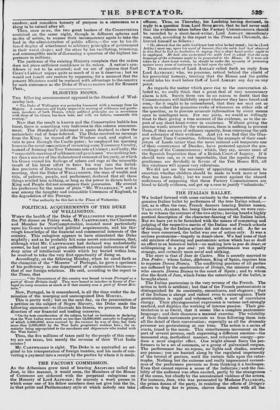POLITICAL ACQUIREMENTS OF THE DUKE OF WELLINGTON.
WHEN the health of the Duke of WELLINGTON was proposed at the Pitt dinner on Friday week, Mr. CARTWRIGHT, the Chairman, and Member for Northamptonshire, insisted most particularly upon his Glace's unrivalled political acquirements, and his thorough knowledge of the financial and commercial interests of the country. This eulogium appears to have stimulated the Duke mightily; and as he probably felt some secret consciousness, that, although what Mr. CARTWRIGHT had declared was undoubtedly correct, he had not yet given sufficient external indications of the deep mine of intellectual wealth which lay buried within him, he resolved to take the very first opportunity of doing so. Accordingly, on the following Monday, when he stood forth as the champion of the "Monster of Portugal, he gave a specimen of his proficiency in one department of a statesman's business— that of our foreign relations. He said, according to the report in the Times, that "the Government of this country was bound to treat Portugal as a part of Great Britain itself. They were bound to interfere in favour of Portugal on every occasion as much as if that country was a part of Great Britain."
Now, Portugal, be it remembered, is all the time under the domination of the usurping and unrecognized Don 1VItouen. This is pretty well; but on the next day, on the presentation of a petition on the subject of Negro Slavery, the Duke made the following statement—to illustrate his fitness, we presume, for the direction of our financial and trading concerns.
"On the best consideration of the subject, he had no hesitation in declaring that the West Indies were worth no less than 12,000,000/. annually to Eng/and ; of which 5,000,0001. were received by the revenue by way of duty, but little more than 2,000,000/. by the West India proprietors resident here ; the remainder being appropriated to the merchants and shipowners who traded with the West Indies."
Thus, the five millions of taxes paid by the people of this country are not taxes, but merely the revenue of their West India estates!
Mr. CART WRIGHT is right. The Duke is as unrivalled as original in his interpretation of foreign treaties, and his mode of converting a payment into a receipt by the parties by whom it is made.


















 Previous page
Previous page